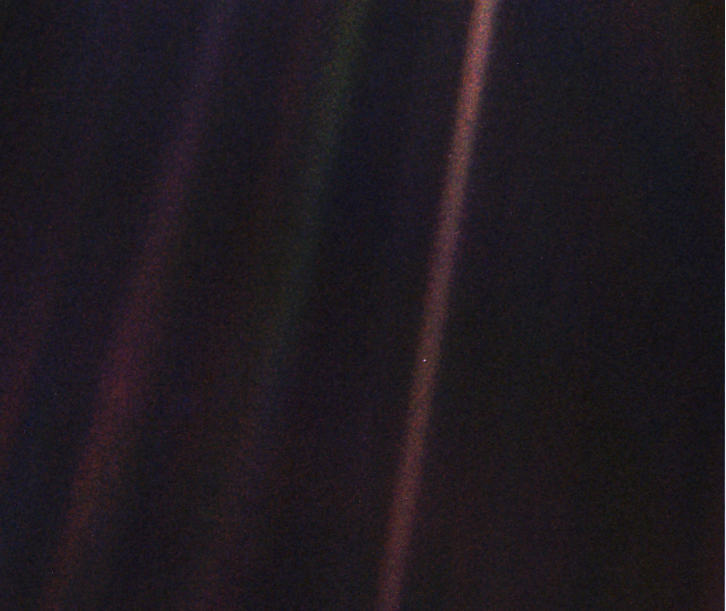Guest Blog by Larry Morrell
 Hubris, n /ˈ(h)yo͞obrəs’/, excessive pride or self-confidence, overbearing pride or presumption. ~ From ancient Greek: the intentional use of violence to humiliate or degrade.
Hubris, n /ˈ(h)yo͞obrəs’/, excessive pride or self-confidence, overbearing pride or presumption. ~ From ancient Greek: the intentional use of violence to humiliate or degrade.
On Christmas day of 2021 at 7:20am Eastern Standard Time, the people of Earth were gifted the launch of an Ariane 5 rocket from Europe’s Spaceport in Kourou, French Guiana carrying the James Webb Space Telescope (JWST). This astronomical instrument is positioned one million miles from Earth outside the orbit of the moon, shielded from both the earth and the sun, and will be able to look farther out into the cosmos than ever before possible. This instrument took decades to design and build, yet will have a lifespan of only five to ten years since it uses on-board fuel for positioning and stability. When the fuel is spent, it will remain staring blankly out into infinity.
Scientists from a wide spectrum of disciplines are excited since the JWST can provide data on the origins of the universe, stars, planets and even life. Theories of dark energy, gravitational waves, life cycles of stars, planetary system formation, planet types and lifecycles, the limits of general relativity, and the origin of life itself will be tested, almost certainly leading to further revisions of our understanding of “reality.”
The origin of life on Earth is theorized to have begun with simple amino acids that combined randomly until, around four billion years ago, they developed the ability to self-replicate. The rocky, hostile planet Earth at that time could not support the life we see today. There was no oxygen in the atmosphere. Radiation from the sun was unshielded and lethal. Bacteria first appeared as early as 3.5 billion years ago. Their metabolism produced a waste product: Oxygen. First in the oceans, and later leaking out into the atmosphere, this bacterial waste product polluted the entire planet within a couple of billion years, formed an Ozone layer in the atmosphere, changed the impact of the sun’s radiation and allowed primitive life forms to emerge from the oceans and begin to populate the lands. It can be concluded that bacteria were the both the first life form to pollute the earth and the whole reason that oxygen-breathing life forms, eventually including homo sapiens, can survive on earth at all.
Fast forward another billion years or so to a mere 65 million years ago, and the 300-million-year dominance of the dinosaurs was about to come to an abrupt end. The Chicxulub crater just off the coast of the Yucatan Peninsula is evidence of an impact of a 10-kilometer-wide asteroid that effectively wiped out at least half of all life forms on earth. The theory is that this allowed mammals to become more dominant, leading to the evolution of hominids including homo sapiens, a relative newcomer appearing about 300,000 years ago. For perspective, that is 0.1% of the time the dinosaurs were the dominant life form on earth. That bears repeating: dinosaurs dominated the earth 1,000 times longer than humans have existed.
In a speech given on May 11, 1996, astronomer Dr. Carl Sagan described our planet when showing a picture taken by Voyager 1 in 1990 3.7 billion miles from Earth:
“Look again at that dot. That’s here. That’s home. That’s us. On it everyone you love, everyone you know, everyone you ever heard of, every human being who ever was, lived out their lives. The aggregate of our joy and suffering, thousands of confident religions, ideologies, and economic doctrines, every hunter and forager, every hero and coward, every creator and destroyer of civilization, every king and peasant, every young couple in love, every mother and father, hopeful child, inventor and explorer, every teacher of morals, every corrupt politician, every ‘superstar’, every ‘supreme leader’, every saint and sinner in the history of our species lived there – on a mote of dust suspended in a sunbeam.
“The Earth is a very small stage in a vast cosmic area. Think of the rivers of blood spilled by all those generals and emperors so that, in glory and triumph, they could become the momentary masters of a fraction of a dot. Think of the endless cruelties visited by the inhabitants of one corner of this pixel on the scarcely distinguishable inhabitants of some other corner, how frequent their misunderstandings, how eager they are to kill one another, how fervent their hatreds.
“It has been said that astronomy is a humbling and character-building experience. There is perhaps no better demonstration of the folly of human conceits than this distant image of our tiny world. To me, it underscores our responsibility to deal more kindly with one another, and to preserve and cherish this pale blue dot, the only home we’ve ever known.”
The James Webb Space Telescope might be able to instill a sense of perspective regarding who we are as a species, where we are in space-time, and how precious all life is on our small planet in the vast expanse of the observable universe. A vastness we cannot comprehend.
Astronomical, geological, and evolutionary time scales are difficult to relate to from our anthropomorphic point of view. In a few million years, homo sapiens may be part of the fossil record studied by a new life form we cannot imagine. Our brief lifespans are scarcely detectable on any of these scales. Yet we humans arrogantly presume mastery of earth’s biosphere, conquer each other, fight needlessly, both hoard and waste resources, exploit each other, discount the worth of other species, and build systems that we know are not sustainable.
Another asteroid will hit the earth someday. Or a severe solar storm will envelop the earth and extinguish all technology and most life forms. Whether it’s tomorrow or in a million years, homo sapiens will become extinct; new life forms will arise. The earth, solar system, and universe will continue. There is no essential need for humans – indeed, the rise of homo sapiens is an accident waiting to happen.
We argue over who is most worthy, who has the “right” philosophy, which god is the most godly, which enemy is the most threatening, who deserves food and shelter and who does not. Or we argue over the best way to end discrimination or who has the right to say what to whom or how severe climate change really is. And on and on. When, quite simply, following Dr. Sagan’s admonition: “…to deal more kindly with one another, and to preserve and cherish this pale blue dot, the only home we’ve ever known,” is all we really need to do.
Perhaps the James Webb Space Telescope will bring news that will help us gain some perspective.
At least, that’s my hope.

I appreciate your essay so much. There’s always a different choice than the choice we think lays before us. We get so lost in our own certainty, when so little about humankind is certain. Thanks
My hope, too! Kindness, and perspective — both vital. Let’s all take our constricting blinders off, and gaze through our empathy telescopes. Thanks for this light-filled vision.
Thank you. Your essay provides a needed perspective. I wish it would be published in every newspaper & disseminated on the internet, so all could realize what is coming.
Excellent piece, Larry. Thanks for the reminder.
Larry, you have beautifully and clearly put things in perspective. Thanks. Gayle Kaune
Recently read Trevor Noah’s book, Born a Crime, about growing up in apartheid South Africa. There’s a QUUF discussion group going on about it. Your essay makes the mindlessness in the book even more stark! Remember Horton Hears a Who? Similar reaction in me! Thanks for the perspective….
Wow, there’s the big picture for us putting our petty squabbles into perspective. Thanks Larry!
You are speaking truth. I appreciate that language.
Bravo!
Thanks Larry. Nothing like little perspective!
So interesting and certainly puts our foibles in perspective. Thank you Larry. Stan would have loved this.
Excellent Larry. Thanks